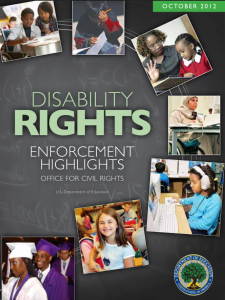
As an Orange County special education attorney, California, I am writing here to explain my opposition to the School Superintendent’s Association’s (AASA) recently released policy proposal Rethinking Special Education Due Process (RSEDP). I have a number of concerns with this document which I would like to address. First though, let me give a brief overview of the document’s purpose and policy proposals.
IDEA is the major law governing special education
law in school. It currently is past due for reauthorization, but to borrow a line from another special education blogger, Jim Gerl, “Congress is too busy ignoring other important issues at this time.” Since it stands to reason that Congress will indeed decide at some point to address this important piece of legislation, AASA produced RSEDP for the purpose of influencing the conversation around what sort of changes should be included when that gets done.
In a nutshell (for a longer discussion of what RSEDP contains, read my article on
Examiner.com), AASA is proposing a complete overhaul of the dispute resolution section of IDEA. Under its proposal, due process hearings (DPH) would be eliminated, mediation would no longer be binding, and parents would no longer be allowed to be represented by attorneys or advocates during mediation. In place of DPHs, AASA recommends two alternative procedures, facilitated IEPs and a “consultant IEP process.”
Facilitated IEP: A facilitated IEP would be used to resolve disputes before a formal due process complaint has been filed by bringing in an outside contracted “state-approved, trained IEP facilitator” who would be a “neutral, state-provided, trained facilitator.” The facilitator would attempt to help the district and parents reach agreement before legal paperwork is filed. Personally, I do not have any issue with the addition a facilitated IEP when an IEP between the district and the parent fails to reach agreement. Such a system can help solve problems before they become larger and more personal.
Consultant IEP Process: If a formal due process complaint has been filed and mediation failed or if one of the parties believed that mediation would be fruitless, the parties would be required to select “an independent, neutral special education consultant designated by the state to review evidence of the child’s disability and advise the parties on how to devise a suitable IEP.” The consultant would have 21 days to collect all the necessary information and design an IEP to be given to the parties. Both parties would agree to honor the IEP for an agreed upon period of time. If at the conclusion of that time period either party was dissatisfied with the consultant’s IEP, that party could litigate their claim in court.
As a special education attorney here in Orange County, Calfornia, following are some of the major objections I have to AASA’s proposal.
This is a Civil Rights Issue
The reason why IDEA was enacted over thirty years ago was to protect the civil rights of disabled students. AASA argues that these protection can now be watered down because of increased government oversight of special education programs due to mechanism within IDEA 2004 and No Child Left Behind (NCLB). I strongly disagree. Yes, these measures have increased oversight on the overall special education system. Under NCLB, districts are required to report on the overall academic achievement of their disabled students and schools and districts can face sanctions for not meeting nation-wide standards on these measures. It is also true that IDEA 2004 requires districts to report on numerous performance and compliance measures. Failure to comply with these rules can lead to a loss of significant federal dollars.
Yes, these things are true. However, these are macro measures not micro measures. They ensure the system is working as a whole; these laws do nothing to ensure that a district is meeting the needs of an individual child. It is not enough to say to a parent that district children are advancing, but sorry, the IEP for your child does not ensure a free and adequate public education. Each parent and child count, so to undermine the system supporting their right to challenge a district premised on the notion that the overall system as a whole now has greater accountability simply is insufficient. Civil rights are there for the individual. It is not enough to argue that we are meeting the needs for some percentage of individuals; the system is there to protect each individuals right to an education.
Unfairly Tilting the Balance of Power
After reading AASA’a RSEDP, I walked away with the strong suspicion that AASA was trying to place its thumb heavily upon the balance of power that currently exists between parents and districts. The proposal seeks to strip parents of the right to representation during mediation. While I know lawyer-bashing is an American past-time, lawyers and advocates serve an important role in special education mediation. Keep in mind what such a mediation would often look like. During mediation, a highly-trained district office administrator, many of whom who hold doctorate degrees in education or more specifically special education, would be facing a parent who is generally lacking in knowledge about education in general and also special education law. There is a gross mismatch in terms of understanding of the system and its rules and regulations. Such a situation literally invites district overreaching.
The AASA report states the use of attorneys has limited the effectiveness of mediation because their presence “complicates and compromises the outcome of mediation.” I was interested in following up on this quote and the context in which it was given but was unable to do so because the footnote is incorrect. It states the author of the quote is Mueller and states she is cited at 58. She is not. She is cited several times in the report, but the articles as cited are not accessible unless one is a subscriber to a service. That said, what attorneys provide is knowledge of their client’s rights. If advocating for their client “complicates and compromises the outcome of mediation,” then I would argue the suggested outcome was not a fair one for the parent or, more importantly, the child.
Given the above, it appears that AASA basic proposal is that its members should enter mediation with knowledge and authority while parents should not. They believe that when parents have knowledge of their rights through advocacy that it only complicates the process. Our disabled children deserve a better philosophical approach then AASA is offering here.
A Solution in Search of a Problem
A final issue of mine with the proposal is that it is a solution for a non-existent problem. While the proposal attempts to paint due process hearings as a major source of problems for school districts, the report’s statistics clearly show that DPHs are not. The statistics given here were collected by AASA for use in this proposal. 200 randomly selected school superintendents were surveyed about the impact of the due process hearing system on their respective districts. Of those 200 superintendents, 99 reported that their district had not been engaged in a single due process hearing during the last 5 years. 29 reported having one due process hearing in the last five years, 44 reported having between 2 and 5, 14 reported between 6 and 10, and 6 had 11 or more.
The reality is that when almost half the respondents do not report a single DPH and of the remainder, 3/4 had been involved in less than 5, this is not a significant issue. Also, keep in mind when reading these statistics that AASA did not ask whether the district had prevailed, lost, or had a mixed ruling of losing on some and winning on some of the issues. While it is true that districts prevail more than they lose, a large number of these DPH cases were cases where the parents prevailed because the district involved was not doing its job.
Based on this reasoning, districts are facing a very small number of cases in which the parents do not have a legitimate issue of contention with the district’s proposed IEP or implementation of an actual agreed upon IEP. Also, just because the district won (or the parent for that matter), does not mean that there was not a legitimate question that needed to be resolved. Thus, doing away with DPHs when there are so few of them across the nation is a solution for a problem that does not exist.
Conclusion:
I could go on with other arguments, (effect on the court system, the idea that stress on school personnel is a valid reason to lessen disabled children’s civil right, etc…) but the above should be sufficient to show that AASA’s proposal is flawed and should not be followed. Our disabled children need protection. One only needs look back to the system that existed prior to IDEA where only 20% of our disabled children were even being educated to know that IDEA and its protections serve an important purpose. IDEA is an important civil rights tools and should not be watered down based on the flawed reasoning displayed in RSDEP.
For another thoughtful criticism of this proposal by Mary Richard, a special education attorney, click here.
Gregory R. Branch is an Orange County attorney who practices in the area of special education. If you are having a dispute with your local school district, please call him at (714) 856-1166 or email him at gregorybranch@edrightsadvocate.com.



